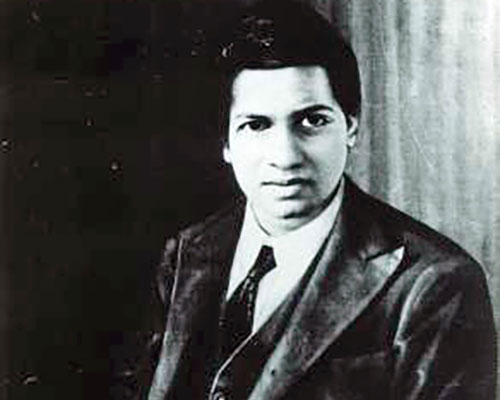Srinivasa Ramanujan.

William “Bud” Hart, of Haverhill, shares “Success Principles”—ideas for living a greater, better and more accomplished life, and building habits that stick. He also coaches clients to incorporate strategies for boosting their mental and physical performance during everyday living.
In 1913, Srinivasa Ramanujan a 25-year-old Indian accounting clerk and self-taught mathematician wrote a letter to the leading British mathematician of his time Godfrey Harold Hardy. In it, he asked Hardy’s opinion regarding equations and ideas he had about numbers. This letter led to Ramanujan coming to Cambridge University in England in 1914 and set in motion an extraordinary series of events in mathematical history. Srinivasa Ramanujan’s life is documented in a movie titled, “The Man Who Knew Infinity,” which I watched with my wife last weekend.
The film focuses on two men with two different philosophies and approaches to mathematics and life. Srinivasa Ramanujan just knew things and believed, while G.E. Hardy had to prove everything before it could be believed. Hardy persistently placed an emphasis on reason, logic and proofs, while Ramanujan relied on intuition and imagination to bring his love for math and mathematical patterns to life.
At one point in the movie Hardy tells Ramanujan, “Intuition is not enough. It has to be held accountable.” But for Ramanujan, math was a matter of divine inspiration. Many people think that intuition is the domain of a gifted few, such as Srinivasa Ramanujan. I know from personal experience as well as observing and listening to others that intuition is an unfailing inner gift; a resource that gives anyone who cares to pay attention direction toward their hopes and dreams.
Science confirms this. Researchers have found that intuition is a part of all of us; our quick, instinctual subconscious way of operating. It is a mode thinking that comes on rapidly, from an unknown source and often does not make rational sense to us. In other words, intuitive decisions are not something that we have thought out carefully with reason, but rather choices that come quickly out of instinct. And science has also shown that intuition can be developed and become second nature when we practice it (as Ramanujan did).
Intuition comes to us in various ways. It can be in the form of images, symbolic pictures, vivid dreams, emotions, sensations and just direct knowing. Sometimes it comes as hearing in the mind. Ramanujan described it this way in the movie, “My god, Namagiri, she speaks to me, puts formulas on my lips when I sleep, sometimes when I pray.”
Although it is not clear in the movie, I read that within Indian culture it was not an option for Ramanujan to go to Cambridge to study in 1914. That is, not until his mother had a dream. One night, she dreamt of her son mingling amongst the westerners when the god Namagiri intervened in the dream and implored her not to interfere with this, as it was her son’s destiny. Supposedly Ramanujan had a vision similar to his mother.
From the movie and a bit of research one would have to agree with Hardy’s initial assessment that Ramanujan was a math genius. He obtained a scholarship to a local college, but dropped out almost immediately because he couldn’t make himself study any subject other than math. Then he got accepted to another college, and dropped out again because they made him study non-mathematical subjects and he failed a physiology class. Then, he nearly starved to death because he had no money, no scholarship and could not find a job. But he never quit. He continued to follow his heart, listen to his inner voice and trust his gut. Eventually it took him to Cambridge where he fulfilled his dream of publishing his math findings, many of which remain useful still today, including helping scientists make some sense of how black holes might work.
Our intuition is a divine gift that is always there, always guiding, always directing and always providing unwavering and reliable wisdom for us to follow. Jonas Salk, the famous virologist who discovered the polio vaccine, once said, “Intuition will tell the thinking mind where to look next.” Ramanujan’s life story proved this to be true.
William “Bud” Hart is a certified “Mindset” Coach, Accountability Partner and Business Consultant. Visit Hart Group, www.hartgroupma.com for more on coaching.

